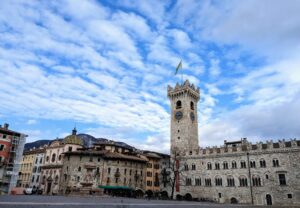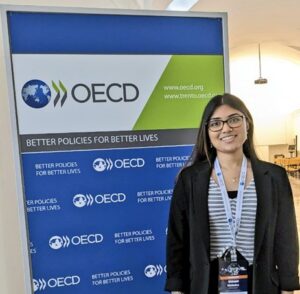
Written by Shivani Sickotra
OECD Trento Centre, Italy: This first-edition winter school was organised by the Organisation of Economic Co-operation and Development (OECD), the European Association of Development Agencies (EURADA) and Trentino Sviluppo. It was held at the OECD Trento Centre in Trento, Northern Italy.
It was a 3-day comprehensive residential winter school involving presentations, field visits and activities focusing on local economic development in Europe and the Smart Specialisation Strategy, also known as the S3 (this strategy can be seen as the European equivalent of the UK Levelling Up agenda).
What notably sets the S3 apart is that it was formulated from an entirely place-based and bottom-up perspective. I had not heard of this strategy before I attended this winter school, therefore listening to presentations from experts and discussions with peers broadened my international knowledge. This was extremely refreshing since my PhD research is UK-focused.
I was one of 24 participants selected to attend and the only member from the UK. My peers were from 11 different countries across Europe, including: Bulgaria, Croatia, Czech Republic and Germany. Most participants were heads of their respective regional development agencies, senior managers, directors and CEOs. As a PhD candidate interested in local economic development, this was an exceptional opportunity for knowledge gathering and networking with established professionals. I enjoyed meeting these amazing individuals from all walks of life, but with the common interest of place-sensitive development. The fully packed days, including lunches and evening dinners, led us to rapidly forming good working relationships.

The 3 days were organised around key themes. Day 1 focussed on the Innovation ecosystem in the Trentino area by delving into entrepreneurship, start-up and Small and Medium-sized Enterprise (SME) scale-ups. This was a new topic to me since I do not come from an economics background. We visited the CLab at the University of Trento, were introduced to Hub Innovazione Trentino (HIT) and visited the Bruno Kessler Research Foundation. These visits showed us first-hand how Trentino attracts start-ups, fosters the transition from research into entrepreneurship and supports these companies. I learnt how this can lead to local economic growth in the Autonomous Province of Trento and how this is a place-based initiative for the region.
Day 2 revolved around Smart Specialisation in practice with an emphasis on green transition, resilience and skills. We took a coach to Rovereto, the second largest city in Trentino. We spent the morning at Progetto Manifattura which is a green innovation factory. This used to be an old tobacco factory in the mid-19th century but was re-purposed into an innovation factory, plus spaces for businesses to rent. It was a phenomenal space, and I witnessed the level of investment into innovation in Trentino and truly S3 in practice. In the afternoon we visited Polo Meccatronica which houses the Trentino Sviluppo headquarters. Through presentations, I learnt about the development agency, their mission, mandate, practices and projects. I learnt more about the general structure of the S3 strategy and the European Commission views on Smart Specialisation. Following this, we had a peer-exchange session in breakout groups. I chose to participate in the Education and Skills group, alongside other participants interested in this area such as the Human Capital Development Expert at the European Training Foundation. This was really interesting, and I enjoyed learning how countries such as Malta develop their local skills strategy. This inspired me to learn more about the South Yorkshire MCA skills strategy currently being drafted in the UK. I would like to know the process behind how this document is created, how policies are proposed and how research such as my own can be tailored into providing a place-sensitive evidence base for this.
The final day was themed around instruments and policies to boost local competitiveness. We had roundtable discussions about teleworking, local labour markets and greening jobs in Trentino. There were also presentations about research papers and official reports to achieve local competitiveness. Hearing how research has been used to achieve this impact was very insightful, and I aspire to one day mirror this with my PhD research by delivering local and economic growth in South Yorkshire.
Overall, this was an incredibly enriching experience which strengthened my understanding of local and regional economic development from an international perspective. I am grateful I found this opportunity as it equally played an integral part in my personal development. I am thankful to the Economic and Social Research Council and the Data Analytics and Society CDT and my PhD supervisors for enabling the trip.